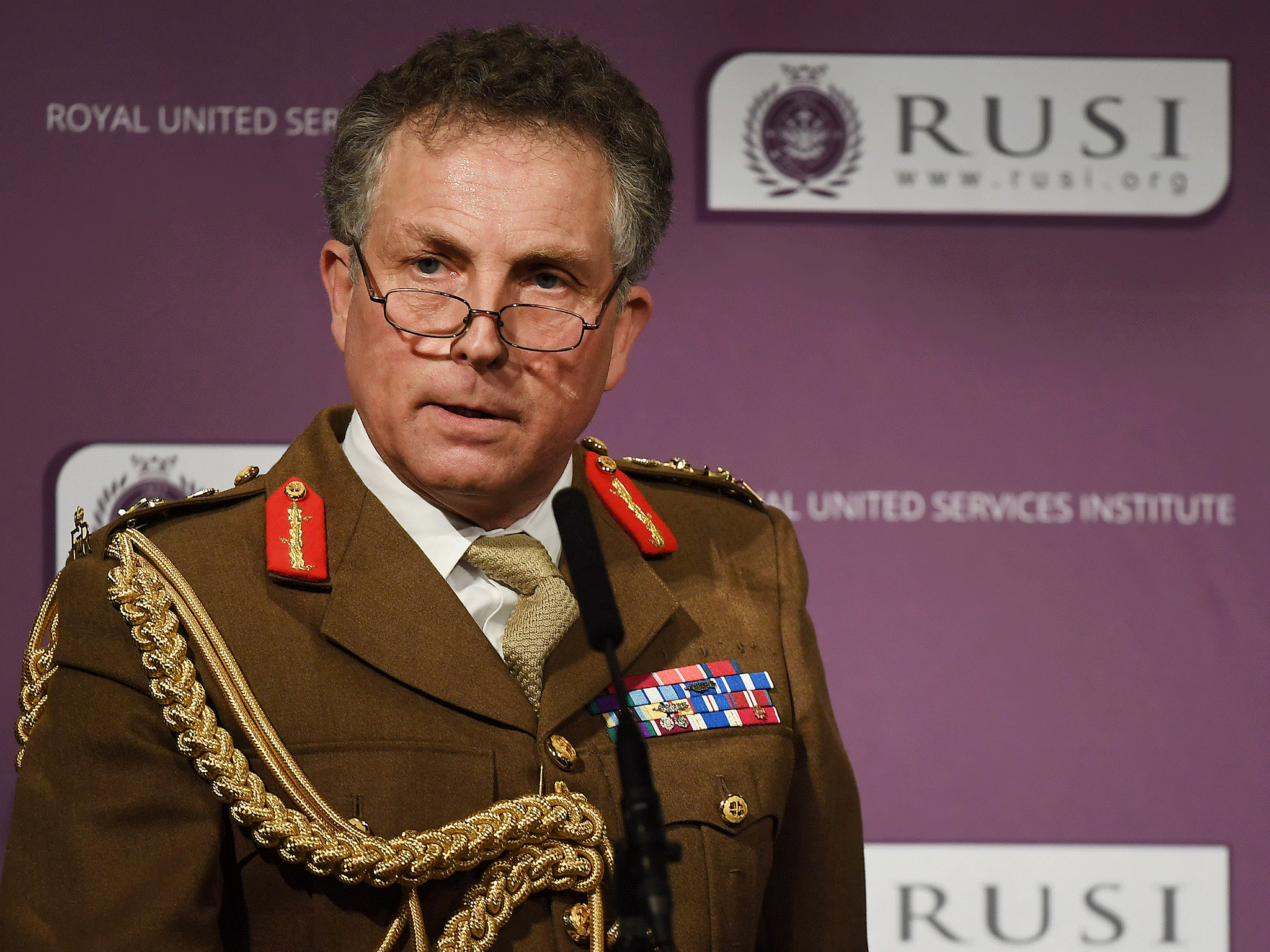General Sir Nick Carter: Army chief named as new chief of defence staff
'It is a testament to him that over his period of leadership the Army has become more reflective of the society it serves'

Your support helps us to tell the story
From reproductive rights to climate change to Big Tech, The Independent is on the ground when the story is developing. Whether it's investigating the financials of Elon Musk's pro-Trump PAC or producing our latest documentary, 'The A Word', which shines a light on the American women fighting for reproductive rights, we know how important it is to parse out the facts from the messaging.
At such a critical moment in US history, we need reporters on the ground. Your donation allows us to keep sending journalists to speak to both sides of the story.
The Independent is trusted by Americans across the entire political spectrum. And unlike many other quality news outlets, we choose not to lock Americans out of our reporting and analysis with paywalls. We believe quality journalism should be available to everyone, paid for by those who can afford it.
Your support makes all the difference.The wall of Major General Nick Carter’s office in Kandahar displayed a chart showing the Pashtun tribes, clans and sub-clans of southern Afghanistan. Bewildering in its complexity, it eventually overflowed into the next room. The general, however, was adamant that the intricate level of information was essential in understanding the dynamics of the local community and the Taliban.
General Sir Nick Carter, as he is now, the newly appointed head of the military, has built up a reputation for an eye for detail and also a penchant for thinking ”out of the box”, taking an alternative view. This has not always gone down well with traditionalists in the armed forces.
His plans, as army chief, to attract more women and those from ethnic minorities, and make the recruiting approach less macho, with a media campaign which told prospective applicants that it is perfectly natural to show emotion and practice one’s own faith, caused controversy.
Gen Carter’s response to criticism was: “I happen to be very proud of the fact that the British army really does respect the background, ethnicity and gender of anybody. What this campaign is about is a recognition that we don’t have a fully manned army at the moment, that the demography of our country has changed, and that we need to reach put to a broader community in order to get the right talent.”
His riposte to critical questions about the policy on the Today programme was: “We are the sort of employer who, incidentally, I might say, don’t have different pay scales for anybody in our army, they are the same whatever your gender might be”. A low blow at the BBC, some may have thought; Nick Robinson responded: “Touché.”
Gen Carter has not been entirely successful in his pursuit of altering the army brand. His plans to drop the long running slogan “be the best” – after market research showed it to be considered dated and elitist – led to howls of protest from some quarters. The new defence secretary, Gavin Williamson, who is said to be in a hurry to get to No 10, and never slow in spotting a tabloid headline, overruled the change.
The promotion to the head the military, chief of defence staff (CDS) from the army’s chief of general staff (CGS) appears to show that Gen Carter has overcome disapproval over his stance. He faced stiff competition, from among others, General Sir James Everard and General Sir Gordon Messenger, who would have been the first Royal Marine to head the armed forces had he got the job.
Gen Carter’s predecessor as CDS, Air Chief Marshal Sir Stuart Peach, is held in high regard internationally by Britain’s allies. He will go now go on to become the first British chairman of the Nato Military Committee for more than two decades.
Theresa May described Gen Carter’s appointment as a “super choice” and gave backing to the reforms he is carrying out. The prime minister stated: “He will bring vast experience to the role having served as chief of general staff for nearly four years. In that time I have been impressed not only by the reforms he has carried out with the British army, but by the care he has demonstrated for the men and women under his command.
“It is also a testament to him that over his period of leadership the army has become more reflective of the society it serves. I am confident Gen Carter will bring the same dynamism to his new role and I look forward to working with him.”
Mr Williamson said: “Gen Carter has been an exceptional chief of general staff, leading the army at a time of rapid change, with troops deployed to deter Russian aggression and protect our Nato allies in the east. He has also overseen the delivery of vital training to help Iraqi security forces defeat Daesh [Isis]”.
But Gen Carter faces a challenging task with a range of threats from Islamist terrorism to cyber warfare and a looming confrontation between the West and Russia. At the same time there is a huge hole in the defence budget and the numbers in the armed forces have been shrinking.
When Gen Carter served in Afghanistan, the international military presence in the country – mainly ground forces fighting a deadly, but lightly armed, insurgency – was 103,000. The size of the British army at present is now just 82,000 and the whole of the military, including the navy and the RAF, comes to less than 147,000.
Join our commenting forum
Join thought-provoking conversations, follow other Independent readers and see their replies
Comments